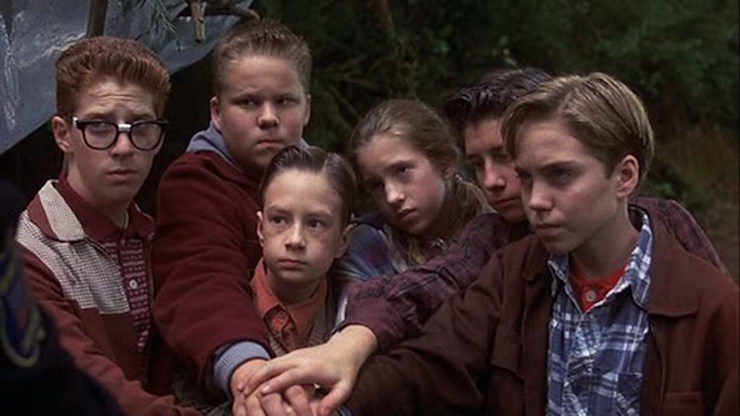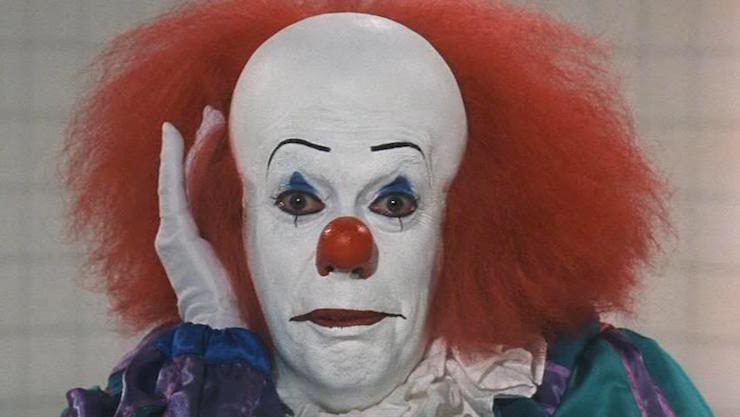The new film adaptation of Stephen King’s It is already breaking records, with a massive opening weekend following a wave of positive early reviews. The story of seven childhood friends who are brought together by their shared fight against an ancient evil, and then reunite decades later to finish the job, it’s still justifiably regarded as one of King’s best. There are moments that don’t work, some that are frankly baffling (and if you’ve read the book, the moment you’re thinking of? Yeah, me too), but the core of the story remains rock solid. So much so that even first adaptation of the book—the 1990 TV mini-series starring Tim Curry—holds up pretty well, too.
I rewatched it a few days ago for the first time since 1990. It was one of those boundary shows for me, when it first aired; I was just old enough to get away with seeing some of it but not everything. That actually made it even better; getting fleeting glimpses of the Derry streets and a couple of moments with Pennywise. In fact I have a very distinct memory of the first Pennywise sighting but that’s about it. It was part of the shadowy coastline of grown-up entertainment and while I was heading there as fast as I could, in 1990 I still had a ways to go before I could properly approach It.
Watching it 27 years later, the bits that don’t work stick out like sore thumbs. Weirdly, most of the problem seems to lie in the direction. TV was incredibly static in 1990, and I know in this manic post-Paul Greengrass era we live in, that doesn’t necessarily sound like a bad thing, but it actually was. A lot of scares are rendered toothless by how flatly they’re presented, and that’s not helped by some weirdly sluggish pacing. The end of Episode 1 in particular is this moment of Troll 2-levels of badness where we do nothing but watch someone realize something awful has happened VERY, VERY SLOWWWWWLLLLLLYYYY.
King’s recurring problems depicting women are also on display for all to see, here. Audra has so little character she may as well be a sign that says “DAMSEL” and Bev, played as an adult with typical gusto and compassion by Annette O’Toole, has a clichéd, off-the-shelf background as a victim of abuse that plays more like ticking boxes than character development. That being said, Bev is at least directly involved in the plot.
Weirdly, the final weakness that really stands out now is Pennywise himself. Not that Curry’s bad in the part—he isn’t. In fact, along with Clue and Rocky Horror, his portrayal of the murderous clown/face of unknowable evil is arguably part of his finest work. The problem comes in the way he’s directed. Time and again we see Curry hit the mark, nail the scare, and then clearly either the script, or the director, felt the need to drag out the moment, diluting the shock and softening the overall effect. It makes Pennywise more overtly comedic than frightening, and pulls the show’s teeth where it should be baring its fangs.
But if you can get past those problems, there’s still a lot to enjoy here and a vast amount of that is down to the cast. Both the child and adult versions of the Loser’s Club are anchored by the character of Bill Denbrough, and Jonathan Brandis and Richard Thomas both turn in great work as the young and adult Bill, respectively. The late, missed, Brandis absolutely nails Bill’s cocktail of terror and rage, and Thomas lands several of the show’s subtler moments. The way his stutter returns is a great character grace note and the sense of his fundamental decency, tinged with the darkness they’ve all faced, is inspiring without coming across as cornball.

Elsewhere, Seth Green and Harry Anderson are great as both versions of Richie Tozier. Anderson’s fast-talking, mile-a-minute shtick and slightly odd, trained magician screen presence provides an interesting discordant note the show repeatedly manages to build upon. In the flashback plot, Seth Green, who gets to be one of the taller members of the ensemble for one of the few times in his career here, plays Richie as a kid on fast forward. He’s witty, sly, never slows down, and, for Mass Effect fans, you can see the seed of what would become Joker in his scenes. Likewise, Dennis Christopher is great as Eddie, and the entire show is anchored by Tim Reid who doesn’t get nearly enough to do as Mike, the group’s designated stoic and “lighthouse keeper.”
A cast this good manages to paper over pretty much every flaw in the script, and the result is an adaptation that’s often uneven but never less than entertaining. Better still, it remains one of the purest distillations possible of both the book and King’s favourite themes. The Loser’s Club are outsiders who make armour out of their joy. They hide inside the painstakingly-constructed consensual fortresses of shared childhood trauma and trust, and together they dare to face down the dragon that’s at its gates. They believe in each other, even when the struggle costs some of them their lives, and the emotional honesty at work here is still so pure, so genuine, that it gets you even now. The final scenes with Eddie and the closing montage are both far more poignant than you might expect or remember, and that’s entirely due to the series’ straightforward, emotionally honest, and open-hearted approach to King’s story. It never once shies away from the horrors of childhood, but it never fails to celebrate the joys of friendship, either. The story is about the Loser’s Club, but it almost feels like a member of the club itself: scrappy, isolated, and ultimately defined and sharpened by everything that tries to tear it down and fails. It’s a survivor, like them. Hi-yo, Silver, away!
Alasdair Stuart is a freelancer writer, RPG writer and podcaster. He owns Escape Artists, who publish the short fiction podcasts Escape Pod, Pseudopod, Podcastle, Cast of Wonders, and the magazine Mothership Zeta. He blogs enthusiastically about pop culture, cooking and exercise at Alasdairstuart.com, and tweets @AlasdairStuart.










